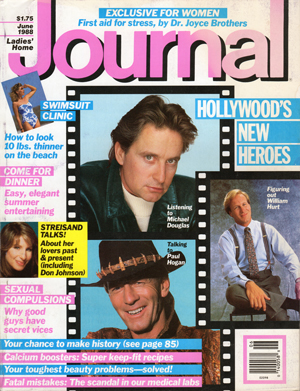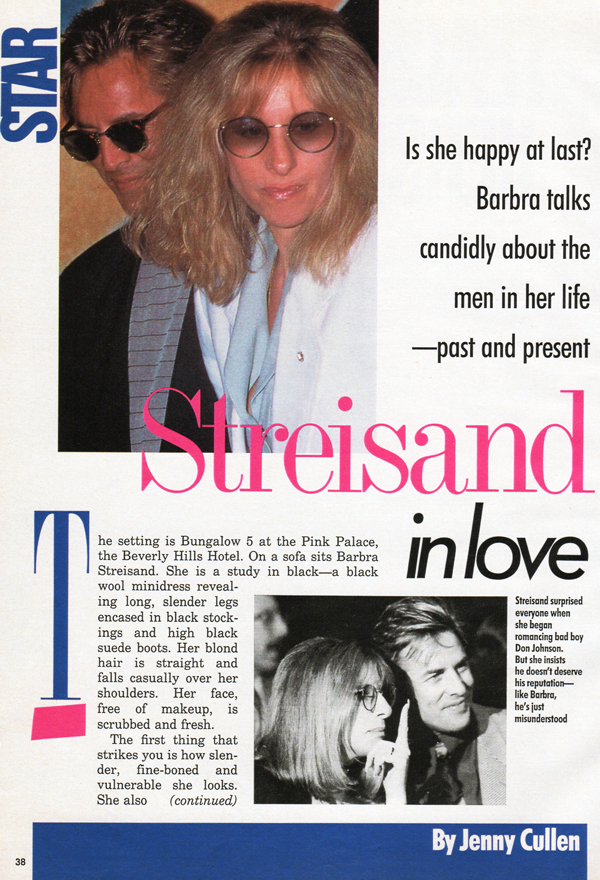Streisand: From Fanny Brice to `Miami Vice'

Ladies' Home Journal
June 1988
By Jenny Cullen
The setting is Bungalow 5 at the Pink Palace, the Beverly Hills Hotel. On a sofa sits Barbra Streisand. She is a study in black — a black wool minidress revealing long, slender legs in black stockings and high black suede boots. Her blond hair is straight and falls casually over her shoulders. Her face, free of makeup, is scrubbed and fresh.
The first thing that strikes you is how slender, fine-boned and vulnerable she looks. She also appears more youthful than her 46 years. The second surprise is that in person Streisand seems not at all the woman who is said to be abrasive, ruthless and driven.
You don't expect the Streisand of popular legend, for instance, to jump up and offer food (“Can I make you a sandwich, get you something?”) when a reporter's stomach gives a loud and long rumble. And you don't imagine her blurting out, “God, you're short!” and giggling with you as you both compare her 5-foot-5-inch height and your own 5-foot-nothing stature.
Soon you forget Streisand is a superstar. She puts you at ease and within a short time, it's like being with a girlfriend who laughs easily and is by turns pensive, droll, self-deprecating and down-to-earth.
But what is perhaps hardest to believe about this actress/singer/producer, who is serious about her work and earnest about her men, is her romance with Don Johnson. The 38-year-old Miami Vice actor, who not so long ago was addicted to drugs, drinking and fast living, has been described as “the bad boy women go for even though they know they should know better.”
Streisand chose to ignore the racy rumors when she met Johnson at a party in Aspen, Colo., last December. At that time she had just ended a four-year relationship with songwriter Richard Baskin, heir to the Baskin-Robbins ice-cream fortune. Even the gossip columnists had trouble believing Streisand and Johnson were an item. But they are, and Streisand says now, “I'm happy, very happy. And I have never been very happy, so it is something I'm learning; it's as if I were a child again.”

Streisand's attraction to Johnson goes beyond his rugged good looks and his ability to make her laugh. “Like me, he's often misinterpreted and called tough and difficult—and it's not true. That is one of our common bonds,” she explains. “And when I'm with Don I can enjoy my celebrity because I don't have to apologize to the man I'm with for getting all the attention. Don gets as much attention as I do.
“There is nothing as satisfying as a good personal relationship; certainly work isn't. I like men. I like sharing my life with a male counterpart. And it is going very well.
“Will it last? How do I know? All I know is this moment. Would I marry again? Yes. But don't ask if I would marry him. I don't know.”
But while she isn't certain of the future with Johnson, Streisand's loyalty to those closest to her was demonstrated when she agreed to make a cameo appearance in an episode of Miami Vice. The series has been suffering from flagging ratings, and there are rumors that Johnson may not return next season.
This kind of generosity is something Streisand would probably continue even if she and Johnson were to stop being romantically involved. She has remained very friendly with the three men with whom she has had long-term relationships—her former husband, actor Elliott Gould (with whom she has a son Jason, now 21); movie producer Jon Peters; and Baskin. Unlike many women who become bitter at the end of a relationship, Streisand remains close to the men she once loved. She calls Baskin frequently, and the couple are buddy-buddy enough for Streisand to be able to discuss Johnson with him; in fact, she is surprised that it should be any other way.
“Once you have loved someone—and how rare it is to love someone—to me you should want to keep that person in your life forever,” she says. “He is important to you. Special. How could you not be very close friends?”
Despite her easy charm and candid disclosures, Streisand loathes giving interviews. This is her first since the release of her Broadway Album more than two years ago. She is wary of the press because she thinks she has received a lot of negative coverage — snide snipes from gossip columnists and film reviewers alike. Reviewers get personal instead of concentrating on her work, she explains. “Someone will write a very good review of, say, Nuts, and then he'll add, `They used gauze filters, and they heavily made her up to look 10 years younger.' ” She shakes her head in disbelief. “Why don't they just say I have good skin?”
She has. It is clear and unlined despite the fact that Streisand is now what used to be called middle-age. She gives a slow, lopsided smile that begins at the corners of her mouth and lights up her whole face. She touches her forehead and says, “I have very oily skin. It was the bane of my life as a teenager. But now it has paid off. With very oily skin you don't wrinkle very much.”
Streisand sees the media misconceptions and potshots in film reviews as part of the business. But that doesn't mean it doesn't hurt. “I don't get angry. I get hurt. It's a strange phenomenon that our society is not ready for a Renaissance woman. It is only ready for a Renaissance man,” she says, referring to the fact that the critics become particularly acerbic every time Streisand takes on more than one role — such as when she produces and directs the movies in which she also acts.
“Society still wants to keep women in their place. It's too threatening somehow to most people, women as well as men. We women are not very generous about one another's success. I think women are still uneasy with feminism. Having gotten our freedom, we're not sure how to use it, and some women take on some of the worst aspects of men.”
Well-rounded individuals, she thinks, are those who embrace both their masculine and feminine traits.
“It is important that many children are now being raised by men. This will help bring about changes. I know that I learned so much more about men by having a son,” she says.
Looking back on raising Jason by herself, Streisand confesses, “In a way I might have been too protective of him when he was younger. And when I worked I also felt guilty. But I tried to explain to him always that work was also a part of my life.”
Streisand's son recently joined the cast of a TV soap opera after taking drama classes and studying film at UCLA. Jason got his start in the industry when he was an assistant to Steven Spielberg on The Color Purple. He also edited his mother's movie Yentl for television.
With her son, Streisand enjoys a relationship based on mutual respect and a tendency toward introspection. “Jason is very much like me,” she says. “He can't stand anything phony. He won't even ride in a limousine with me. He's also very talented and sensitive and kind. And he tells the truth. He doesn't understand people who don't. We're both fascinated by people who say things they don't mean. Honesty is a naive quality we both have.”
These days, Streisand—who can be a workaholic—is taking a well-earned break. Having worked for 2 1/2 years on the movie Nuts, she says, “When you're making a movie your life is not your own. It's like being in prison, and you can't escape.”
So what does she do with all her spare time? “I take walks,” she says. “I cook with a friend. I spend time in my garden. I love flowers and I love growing my own vegetables—organic vegetables. I go to the movies. I read. And I still don't have enough time!”
Streisand thinks that her life is at a crossroads. Her beloved Malibu estate, with its five houses on 24 acres, is up for sale (the price, a mere $18-million), and she is not sure where she will live next.
“I am torn about Malibu,” she says, “because part of me loves the privacy of having 24 acres to roam around in without anybody bothering me. So part of me doesn't want to sell. Maybe I never will sell it. Who knows? On the other hand, there are five houses there, and that's a big responsibility. If there's a heavy rain I'm left wondering which roof it was that leaked this time or which house has no heat.” She bursts out laughing. “It would be such a pleasure, I imagine, to have just one house, one roof, one heating system to worry about. And then there are the gardens . . .”
Streisand, with typical attention to detail, designed and planted them herself — she also knows the botanic names of each plant, tree, flower and shrub. “I love those gardens,” she says, “but that's a responsibility, too.”
These days Streisand is also beginning to plan her next project. She has a TV movie in development with her Barwood Films Co., entitled A Small Town, which is about the struggle of a tiny community to rid itself of a nuclear waste dump. And although it has been reported that she will make a film on the career of Life magazine photographer Margaret Bourke-White, Streisand is not sure. “I don't know at this stage,” she says.
One project she firmly denies she is doing, despite media stories to the contrary, is a revival of Stephen Sondheim's Follies with Liza Minnelli. Streisand is plagued by paralyzing stage fright, which she insists will prevent her from ever appearing on stage or in concert again.
“You don't get over stage fright — you just don't perform. It is too torturous for me,” she explains, confessing that even her private 1986 fund-raiser concert for six Democratic congressional candidates — which was held in her own home — was a terrifying experience. “That was my first full-length concert in 20 years. And I don't think I can do it again. Certainly not a public concert. Not Broadway.”
She insists that the only thing that could possibly get her on a stage again would be the upcoming presidential election. She intends to put her Hollywood clout behind the Democratic front-runner. Before the Malibu fund-raiser she had shown little interest in politics. But now she has become quite vocal and is eager to support the candidates she believes in.
“That's the real use of power, if I have any,” Streisand says. “I had been interested in the anti-nuclear issue for some time, but then in 1986 I realized it was time I did something. There is a real feeling of fulfillment when you use whatever talent you have to contribute to making the world a slightly safer and better place. That makes me feel good. I'll help this year in some way. Sure. For the Democrats.”
Even if it means suffering paralyzing stage fright?
Streisand nods. “I might have to do something for the presidential election,” she concedes. Then she grits her teeth. “I want to do what I can to help.”
“Even performing?” I ask.
“Even performing,” she says.
END
